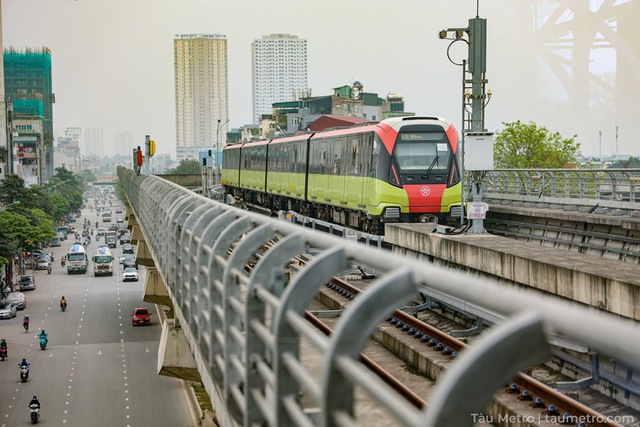Ha Noi unveils five-year plan for smart city development
VGP - Ha Noi has rolled out a new action plan to accelerate its transformation into a smart, green, modern, and globally connected city by 2030.

Nhon – Ha Noi Metro Station metro line (Line 3) — elevated section
The document was issued by the Ha Noi People's Committee on September 8, targeting to harness urban data, digital technologies, and artificial intelligence (AI) to build a digital government that delivers better services for citizens and businesses.
Specifically, the city aims to integrate into national, regional, and global smart city networks, while driving growth across the Red River Delta, the northern key economic region, and the country as a whole. The city is targeting leadership in data-driven governance, digital technology adoption, and advanced data analytics across state agencies and socio-economic sectors.
The plan sets a GRDP growth goal of 8.5 percent in 2025 as a foundation for achieving double-digit growth in the years ahead. People remain at the center of development, with initiatives designed to improve quality of life and optimize public services.
Smart city building will prioritize cybersecurity, digital sovereignty, and information security. Key focuses include upgrading infrastructure for science, technology, innovation, and digital transformation, while also attracting and developing high-quality talent.
Practical applications will cover smart traffic management, cashless toll collection, intelligent parking, smart lighting, energy, and water systems. Ha Noi will also encourage pilot projects that test new technologies and services in line with national science, technology, and digital transformation strategies.
Local communes and wards are tasked with experimenting in smart urban areas and buildings using technologies such as Building Information Modeling (BIM), City Information Modeling (CIM), Geographic Information Systems (GIS), AI-powered GEOAI, and the Internet of Things (IoT). Development of digital twins of urban areas and buildings is also expected to accelerate Ha Noi's smart urban agenda.
Accelerating smart city development amid challenges
So far, data centers and an integrated data-sharing platform (LGSP) have been built. Key databases on population, land, transport, and enterprises are being digitized, though not yet fully synchronized. 4G/5G networks and broadband Internet are expanding, but suburban areas are not fully covered.
Regarding implications in Public Services and Urban Management, online public services (levels 3 and 4) are widely available and linked with the National Public Service Portal. Pilot projects in smart traffic management (adaptive traffic signals, non-stop toll collection, smart parking) are operational in some areas. Surveillance systems with AI analytics support security and traffic monitoring.
In term of urban infrastructure and utilities, several districts have introduced smart lighting, automated irrigation, and air quality monitoring. IoT-based solutions are being tested in water drainage, flood control, and waste management.
Ha Noi is also Viet Nam's largest hub for ICT, AI training, and tech workforce. The city attracts major technology firms (Viettel, VNPT, FPT, CMC) and has expanded international cooperation with partners from Japan, South Korea, Singapore, and Europe.
However, the city is coping with some shortcomings including data fragmentation across departments, with limited interoperability, funding constraints for large-scale infrastructure and smart solutions, need for stronger public–private partnerships (PPP) as well as increasing risks in cybersecurity and digital sovereignty./.

